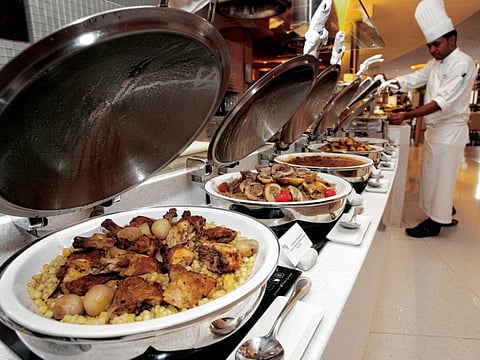Do not overeat at the buffet table
Generally, people do not have the time to make small talk when they are eating after fasting for the whole day

So, how is your fasting coming along, people ask me politely and I smile beatifically and say, “Good, thank you.”
So far, nobody has asked me whether I am really fasting, looking deep into my eyes, like my ex-boss would do, and loudly, so that busybodies nearby can hear.
“Of course,” I would reply, hurt that he could suspect me of lying. Why would anybody lie they are fasting, when they are not?
He would persist. “You look too fresh to be fasting.” Not only would he doubt my sincerity, he would come closer and ask, “What about [a friend of mine], is he fasting?”
Hearing this exchange, a colleague came up to me after the boss had left, and said, “You know how you can tell if someone is not fasting. Just look at their tongue, it will have turned white. I learnt this at school. We would ask the suspect to show us their tongue.”
“The white tongue is because of dehydration and dry mouth,” I said. “I am not going to show you my tongue. Believe me, I am fasting,” I would say.
“I don’t look famished and ready to collapse, because I am used to having only two meals a day, just like the Ramadan fast. I don’t have breakfast or tiffin even when it is not Ramadan,” I said.
“You should not miss breakfast, it is an important meal of the day,” said my colleague. “What’s tiffin”? I asked her where was she planning to go for iftar (the meal before sunset when the daylong fast ends). Iftar is the time to share food and break bread with your family and friends. People I barely knew would invite me to their homes, and none of them asked me whether I was fasting or not.
A Pakistani friend once invited me home during Ramadan and he seemed desperate that I should eat at his home. “Please come for iftar,” he said.
“My wife has cooked and the food will last for three days. I can’t keep eating the same things day in and day out, please come, you can bring a friend.”
Every Ramadan, hotels in Dubai set up magnificent tents on pristine beaches or on the hotel rooftops near the pool. As the sun slowly starts to set and the melodic call to prayer comes over the speakers and from the mosques nearby, people would slowly saunter over to the various food stations and quickly start filling up their plates with kebabs, kibbe, mezzeh, araish, soups, Arabian rice, Indian rice, baba ghanoush, tamarind juice, breads, hummus, umm ali, custard, fruit slices and lastly dates.
No time for small talk
During Ramadan, the chef or the head waiter never comes up to you, bowing and smiling, to ask, “How is the food? Hope you are enjoying yourself?”
Generally, people do not have the time to make small talk when they are eating after fasting for the whole day, and it is also wise not to ask your neighbour at the table, about the traffic that evening.
For some reason people do not listen to the advice of doctors. Do you think people will listen to such stuff after 14 or more hours of no nourishment: “Do not over-eat, do not eat spicy food, do not eat too many sweets, do not drink too many cups of tea.”
And the rush to get home before the sun sets is desperate despite the police offering snack boxes to motorists so that they do not start climbing lampposts.
Ramadan is almost over and if you have missed fasting a couple of days, for genuine reasons, you can make up the days lost by fasting before the next Ramadan.
Mahmood Saberi is a storyteller and blogger based in Bengaluru, India.Twitter: @mahmood_saberi.



